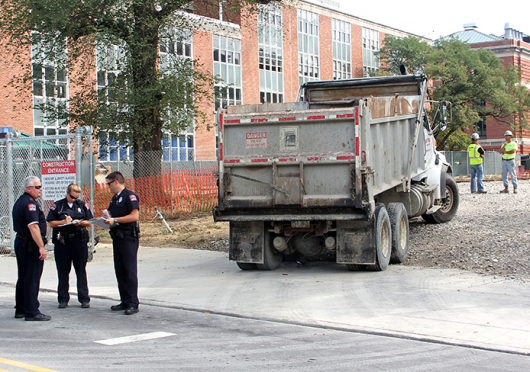
Police survey the scene after then-first-year OSU student was struck by a dump truck on Sept. 5, 2012 on Woodruff Ave. The accident left Daniel Hughes in stable, but critical condition. Credit: Lantern file photo
A settlement has been reached in the case of Daniel Hughes, a former Ohio State student who was struck by a dump truck near a construction zone on campus in September 2012.
OSU will pay Hughes and his family $500,000 and will provide Hughes free tuition for the hours needed for a bachelor’s or associate degree, as long as it doesn’t take more than five years from his date of re-enrollment for him to complete that degree, according to a Court of Claims of Ohio copy of the settlement.
Hughes, who is from South Point, Ohio, was struck by a construction truck Sept. 5, 2012, while riding his bike to class near a construction site on Woodruff Avenue. The then-first-year student was taken to Wexner Medical Center following the accident and had more than 13 surgeries in the months following.
The accident left Hughes without his right leg, right hip and most of his pelvis, or about one-third of his body. He also suffered nerve damage in most of his left leg and some element of brain damage due to blood loss, said Stephen Crandall, the lawyer for the Hughes’ family.
Two separate lawsuits were filed relating to the accident, one against OSU and one against others involved in the incident. More than 15 dispositions were filed against the private entities, which include CT Corporations Systems, Gilbane Building Company, Gilbane Development Company, Gilbane Inc., Bert Hill, Pelli Clarke Pelli, Monesi Trucking & Equipment Repair Inc., Baker Concrete Constructions Inc. and Baker Concrete Structures LLC, as of a Sept. 20, 2013, Lantern article.
Crandall said a “global resolution” was worked out with all parties involved, although only OSU’s portion of the settlement is public — the rest is confidential.
OSU spokesman Gary Lewis said that resolution has a specific purpose — it’s “aimed at helping Daniel as he moves forward,” he said in an email.
“We at the university will continue to support Daniel as he works towards completing his degree here at Ohio State,” Lewis added.
Crandall said the money will help the Hughes family by providing funds for large medical bills related to Hughes’ injuries. But “because of his injuries, this will always be a devastating situation for them,” he said.
Hughes is living at home now — his family, including his three siblings, relocated to Columbus to be closer to his physician. He goes through physical and occupational therapy throughout the week and his family members help care for him throughout the day, Crandall said. He added that Hughes can take care of himself in some respects.
In September 2013, Crandall said Hughes wanted to someday continue with his education.
“He’s hopeful to attend school. He has a desire to and he wants to online,” Crandall said. “He will never be able to go into a classroom setting with his disabilities.”

